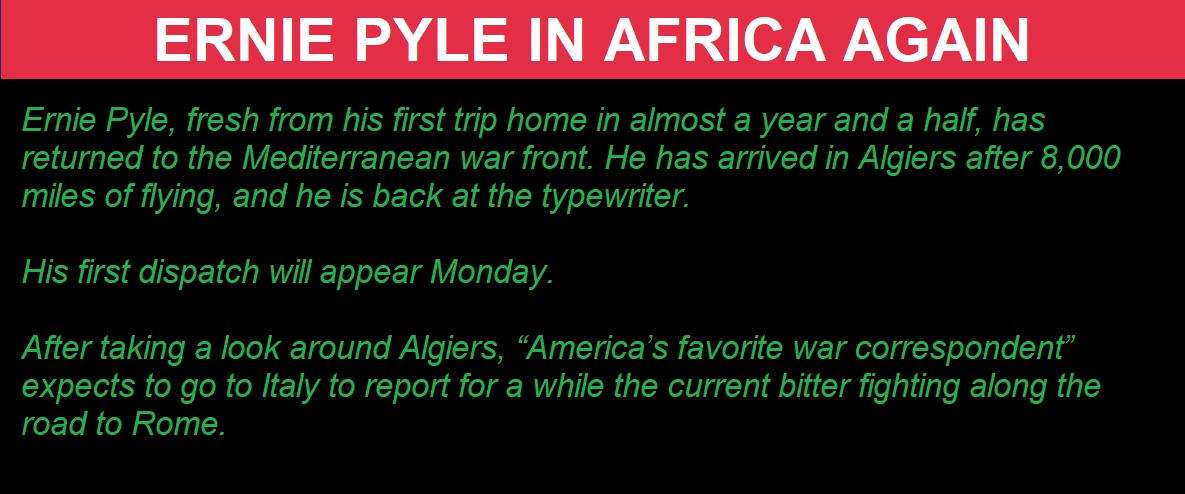The Pittsburgh Press (September 15, 1943)

Roving Reporter
By Ernie Pyle
Washington –
There are a few little African items. I’d like to wind up before this column stops and goes on furlough.
For example, I never got around to telling you about Bob Hope when he was over there. I ran across Bob Hope and his crew in Sicily. In fact, for a couple of days, we did the highlights and shadows of one bombed Sicilian city in such hilarious conjunction that it looked as though I were becoming a member of the troupe.
There are certain dissenters to the policy of sending American entertainers overseas. Now and then you’ll hear some officer say:
After all, we’re over here to fight, not to be entertained. Don’t they know there’s a war on?
But it has been my experience that the most confirmed users of such phrases are usually a good many miles behind the lines. If it’s all possible to give the troops a little touch of America through these movie stars, then I’m all for it.
Bob Hope is one of the best that ever went to Africa. He has the right touch with soldiers. He can handle himself as well in a hospital full of suffering men as before a rough audience of 10,000 war-coarsened ones.
When Hope goes into a hospital, he’s liable to go up to a poor guy swathed in bandages, and instead of spreading out the old sympathy he will shake hands and say something such as:
Did you see my show this evening, or were you already sick?
Army can’t use them
At their regular show, Hope carefully explains the draft status of his troupe, so that the soldiers won’t think they’re draft dodgers. He says that his singer Jack Pepper has been classified 5-X, or “too fat to fight.” Hope himself is in Class 4-Z, meaning “Coward.” And their guitar player Tony Romano is Double S Double F, meaning “Single man with children.” Sure, it gets a laugh.
The Hope troupe, which included lovely Frances Langford as the fourth member, really found out about war when they were over there. Every time they’d stop in a city, there’d be a raid there that night. Actually, it got to look as though the Germans were deliberately after them.
They had the distinction, while in Sicily, of playing closer to the frontlines than any other entertainers, and playing to the biggest audiences. One afternoon they did their outdoor show for 19,000 men.
If this column appears in Hollywood, let it be taken as legal testimony in verification that no matter what narrow-escape story Bob tells when he gets back, it’s true.
I don’t know Gen. Eisenhower very well, because I was at the headquarters city very little during the African campaign, and had no occasion to bother him with my presence anyhow.
But I do admire him greatly, and I suppose just to salve my own vanity and to be able to say I’d seen him recently. I went in to say goodbye the day before I left Africa.
General approval
The general is an observant man. He both flattered me and put me at ease by congratulating me on some recent ones of these columns which he’d read in Stars & Stripes. He left his desk and sat in a big lounging chair in the corner while we talked.
I told him (and with sincerity) that I’d seen our Army grow in Africa from an insufficient, green, bumbling organization up to the point of perfection where now, unless he was able to tell me something wrong with it, I would have to go home without being able to criticize a thing over there.
He said if you could sit at his desk for 18 hours it would seem to you that everything was wrong with it. But I know that in that informal remark the general was tasking the mechanic’s view, and that actually he knows it’s a pretty well-oiled machine by now.
As I left his office, I said half-jokingly:
Is there anything you want me to tell the folks at home when I get there?
He grinned and said:
Oh, just tell them to stick together.

